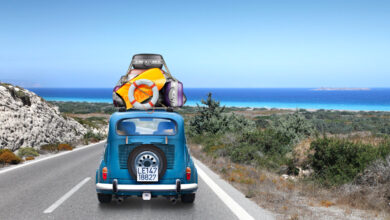Opinion
Don’t Let Others Say: ‘ That Road is Better’
Omar Bihmidine is a high school teacher of English. He holds a BA from Ibn Zohr University, Agadir. His writings take the form of short stories, poems and articles, many of which have been published in Sous Pens magazine and ALC Oasis magazine in Agadir.
Sidi Ifni, Morocco,
By nature, we like to give others advice. We like to tell others where to go, where to play and how to lead their lives. We like to give orders, to impose our choices, and to convince others that our suggestions are the right ones. Whether what we choose for others is right or wrong, we rarely care. Parents incessantly advise their children, and teachers tell their students where to look, what to see, and where to study. In frankness, this is all good. Yet, what I personally think is that we should avoid telling others that the second road is better.
Paulo Coelho, one of the best-selling novelists of today, has taught me that we must make our own decisions and not wait for others to decide what we should do with our lives. “Don’t let others say: ‘That road is better’ or ‘that route is easier,” the author once put it cogently. Here, I must stress that God created us with a power to lead our lives the way we like, to choose what we think is best for us, and to pine for and pursue the path that we think will lead us to our goals. I believe that if we follow what others tell us, we will be led astray and lag behind in realizing our ambitions. Accepting others’ choices while ignoring our own does not serve us well. Worse is that this habit to live others’ lives rather than our own does us much more harm.
When I was in Zagora, my former place of work, I aspired to pursue my studies and earn more diplomas. At the time, I had very few working hours, which means that my ambition was easier to realize. But, making the acquaintance of some fellow experienced teachers in the region persuaded me to temporarily give up some of my ambitions. “We all tried to pursue our studies, but the distance between Zagora and Agadir is so far. You had better read voraciously until you move somewhere nearer, then you can easily attain your goal,” the experienced teachers advised me. I innocently associated their experience with wisdom, thinking that they knew better than I did. I was even convinced by what they told me.
I did not pursue my studies until I moved to Sidi Ifni, my new place of work. Now, I regret following the road others chose for me. I regret it simply because others from more remote areas earned their diplomas without much difficulty. I regret it because I could have realized my dream if I had made my own decision. I regret it because I thought that others knew better than I did, when in fact I knew better what would have been beneficial for me. The mistake I made then was that I didn’t use the gift God gave me, that of making my own decisions. I still regret it for the reason that if I had not met them I would have taken the adventure as others in more remote areas have done and still do. Why should I opt for others’ choices and ignore mine? I sometimes ask myself. Why should I think that their preferred road is better than mine? I often wonder.
In reality, we tend to underestimate our choices and our way of life and go on to follow others. Did not God create us with the same gift and power? We must break this rule of ‘that road is better’, that ‘road is easier’ or that ‘ decision is wiser’. We may consult others, learn from others, get advice from others, and benefit from others’ experiences, but never to the extent that we give up our own choices for the sake of those of others. So many people have ended up becoming teachers, not because they like the profession, but because their wise grandfathers once preached to them on the nobleness of this profession. Here, they have ended up living the life of their grandfather, not theirs.
One of my colleagues once told me a real story that continues to remind me of the importance of tightly clinging to one’s choices. In Zagora, two young studious classmates sat at the same table in class, side by side, during their primary school. They read nearly the same books during their high schools, revised their lessons equally immaculately, got nearly the same excellent grades, chose the same disciplines, and graduated with the same distinction. The only difference is that one of them was forced by his mother to study at university and become a teacher. “No job is better than being a teacher,” the mother told her son. The other classmate did maritime studies, the choice both of them aspired to. Yet, the mother innocently warned her son against the danger of maritime experiences.
At some point in their lives, many people have wanted to become businessmen, but ended up becoming greengrocers, for they were advised to emulate their father, a businessman too, especially if they seek his consent. Some other people have wanted to become policemen, but they ended up becoming waiters, for their mother told them that becoming a policeman is a source of trouble and dangers.
Some others have always wanted to become rich, but they ended up becoming poor, for their friends keep on telling them that money is not everything since it does not bring happiness. Some youth have wanted to become football players, but they ended up becoming dustmen, for their grandparents said that playing football is a waste of time. Some poor students dropped out of school at an early age, for they heard from others that studying leads to unemployment and that finding a job and making money are much better than spending time at college.
The crux of the debate is that we become what others want us to become as though we were born enslaved, as though we did not exist and as though we were merely toys. At birth, we are endowed with the power to make decisions, to say no and to say yes, to agree and to disagree, to oppose and to support, to follow and to renounce, to be a disciple and to be a master, and to learn important things and to unlearn bad habits.
However, only very few of us make use of this power, particularly those who are ready to celebrate their freedom and revel in their capacity for free thinking. Think of those who get married, whether they have chosen their other half on their own or they ask their parents to choose for them, whether they are satisfied with their partner or they just want to please their mother, and whether they love their partner or they just need to get married at any rate as our old grandparents advise us to do.
It is high time we brought about a change to our lives. Here, the stumbling block might be that we fear change, especially because we have also been told that we had better shun the road of change and opt for that of routine stability. We have been told that security is better than adventure, and that those who do not accept advice and others’ choices are doomed to failure. Let us try our own choices and work miracles. Personally, I was once told that teaching would not allow me to enjoy pursuit of my studies. I gave up the idea. Only then did I succeed to earn my B.A. with distinction, one of the goals I remorsefully missed when I used to listen to those who say, ‘that road is better’. Never let others say: ‘ that road is better’.




